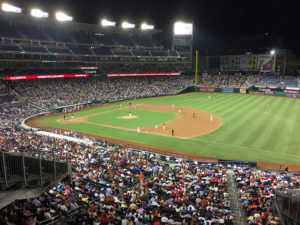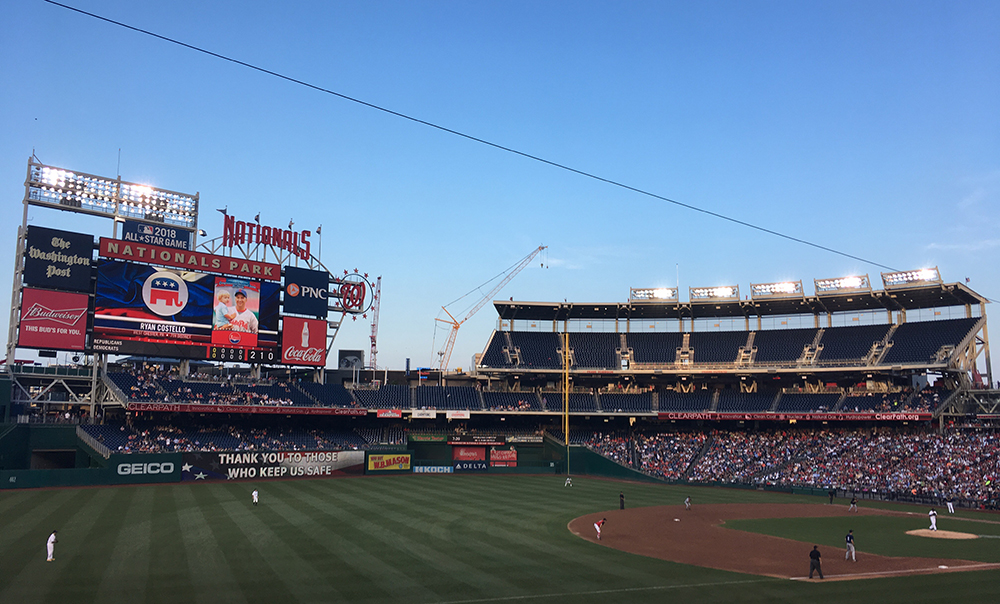Partisanship not Easily Forgotten: My Experience at the 2017 Congressional Baseball Game

The 2017 Congressional Baseball Game will be long remembered as the one played the day after the shooting at the Republican team’s practice in Alexandria, Virginia. Immediate reactions to the shooting lamented the horrific shadow of violence cast over what is normally a fun, bipartisan event. For many this attack on members of Congress appeared as a manifestation of the incredible political divide our country is facing, as the shooter James Hodgkinson was openly anti-Republican online, had volunteered for the Bernie Sanders campaign, and allegedly asked if the players were Republican or Democrat before he started shooting. The Congressional Baseball Game’s mission of friendship and solidarity therefore became more important than ever. Representatives from both sides expressed their condolences to those injured, including Majority Whip Steve Scalise (R-LA), and voiced their intolerance for such violence, no matter the party affiliation. This outpouring culminated in the first-ever joint interview with House Speaker Paul Ryan (R-WI) and Minority Leader Nancy Pelosi (D-CA), where they showed their unified support for “Team Scalise.”
Despite the agreement on both sides that the shooting was an unacceptable tragedy, the fact that the two party leaders of the House had never given a joint interview before reveals the superficial nature of the bipartisanship displayed at this year’s game. A June 19 press release, issued four days after the baseball game, stated that the game raised over $1.5 million for charity and sold 24,959 tickets, more than twice the attendance of the 2016 game. While this record attendance does suggest an outpouring of support and solidarity in response to the attack, the undeniable truth is that the game was not, and could never be, a bipartisan bubble immune to the passionate ideological divide between the two reigning political parties.
Among the mass crowds overflowing outside the stadium, waiting through the long security lines, there were harmless signs with silly indictments towards the parties, like a “Republicans Listen to Nickelback” cardboard sign and fun t-shirts with either GOP elephants or Democratic donkeys on them. However, there were also more serious and controversial messages promoted by those at the game, such as a “Blue Lives Matter” sign and a “Refugees Welcome” sweatshirt.
Rather than a time to put aside politics, the game became the place to openly discuss the hot issues surrounding the tragic shooting of Scalise, Capitol police officer Crystal Griner, congressional aide Zack Barth, and Tyson Foods lobbyist Matt Mika. While there were many spectators donning “Team Scalise” t-shirts, there were those, reflecting the views of their representatives, who railed against the fact that people aren’t allowed to carry weapons in DC. (As one young woman in cowboy boots and a cowboy hat stated, “I just don’t feel safe without my gun.”) People wanted to show their unified support, but they also wanted to make it clear what side of the argument they fell on.
In many ways, it’s ironic that a sporting event would be the place where it was expected for the two political parties to bridge their respective values, even if just for a night. Not only do sports rivalries oftentimes run deeper than political disagreements, they specifically pit one team against the other. Attendees had the option to buy either “Republican seats” or “Democrat seats,” ensuring they would never have to enter enemy territory and acknowledge the existence of the other side. The culminating partisan moment was when my friends and I were standing outside of the main sitting area watching Representatives run bases when a man came over and asked if we’d join in a “Build the wall!” chant. We kindly declined.
Yes, there was a spirit of solidarity around the beer, the bases, and the hot dogs that night, but there was also an unnerving realization that the split in our political values and beliefs could not be so easily forgotten and put aside. Gun violence, immigration, reproductive rights—you name it—are divisive issues for a reason and the expectation that such important, serious, topics on people’s minds and in their lives could be shuffled under the rug for the night is somewhat unreasonable. The tragedy that marred this fun event not only functioned as a unifying force, but also as a divisive one at this year’s game. It was just one more instance of the stark difference in policy thoughts and goals that plague our political arena.
The final score of the game—Democrats 11, Republicans 2—is no indication of how competitive this partisan match-up really is.

Photos by Marlena Trafas
